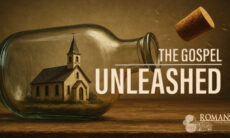We live in a “Baal culture”—success, pleasure, control, self-image. The question isn’t if we worship, but what. Elijah’s showdown on Mount Carmel (1 Kings 18) reminds us: God’s power doesn’t wait for perfect conditions—it answers surrendered faith.
The Battle for Allegiance
Israel had drifted into idolatry under Ahab and Jezebel. Baal worship promised prosperity and control—but left them empty. Elijah didn’t step into the chaos to argue theology; he called people to a decision.
The Locker Room Moment: Before the 1980 “Miracle on Ice,” coach Herb Brooks told his outmatched team, “You were meant to be here tonight.” He wasn’t telling them how to win, but who they were. Elijah is that coach on Mount Carmel—reminding God’s people whose jersey they wear.
Reflection: Where are you wavering between God’s way and the world’s way?
I. The Confrontation: Standing Alone in a Compromised World (1 Kings 18:20–24)
Elijah draws a line in the sand—one prophet against 450. He challenges Israel’s spiritual double-life: stop hobbling between two opinions.
- Line-in-the-sand moments take time. After years of drought and silence, hearts were finally soft enough to hear.
- Faithful obedience doesn’t wait for favorable odds. Elijah moves because God has spoken, not because conditions are ideal.
Navy SEALs don’t wait for perfect weather—or freelance their own mission. Confidence comes from training and a commander’s word. Elijah walks onto Carmel like that: outnumbered, outshouted, certain of his orders.
Scriptures: Romans 8:31; 2 Timothy 1:7
If God’s Word has already spoken into your situation (sin, leadership in your home, integrity at work), move now.
Questions to Consider
- Where am I hesitating between two opinions?
- What would a public, faithful stand look like—at work, with friends, in my home?
II. The Comparison: When False Gods Go Silent (1 Kings 18:25–29)
Baal’s prophets shout, dance, and cut themselves—no voice, no answer, no attention. Idols always over-promise and under-deliver.
- Modern Altars: Approval metrics, “just one more” success hit, comfort that numbs but never heals.
- Mercy in the Silence: Sometimes God lets counterfeits fail us so we can finally see they’re empty.
Psalm 115:4–8; Jeremiah 2:13
Journal Prompts
- What’s draining your energy but not delivering peace?
- Where are you performing for a “god” that never answers?
- What noise needs clearing so you can hear God’s voice again?
III. The Construction: Preparing the Altar for God’s Power (1 Kings 18:30–35)
Elijah repairs the Lord’s altar—twelve stones for twelve tribes. He orders the wood, lays the sacrifice, and soaks everything with water. No rush. No show. Sacred ground.
If you want God’s fire, start by rebuilding God’s altar.
What does rebuilding look like?
- Priority Reset: Return your rhythms to a biblical perspective.
- Repentance & Repair: Before fire falls, altars must be rebuilt—prayer, confession, relationships restored. (Psalm 51:17)
Three “Altars” to Rebuild
- Walk with God: Give Him the first 15 minutes again—Word open, phone down, honest prayer. (Psalm 51:12)
- Integrity: God can’t bless what we fake. Choose the hard, honest road. (Proverbs 10:9)
- Marriage: Don’t outsource connection. Show up with time, tenderness, and prayer. (Ephesians 5:25)
An altar is what you’re willing to sacrifice yourself for—pride, control, or comfort—to let something greater live.
Bridge Picture: When a Nebraska community rebuilt a century-old bridge, one man said, “We didn’t just rebuild a bridge; we rebuilt community.” Elijah is doing that—restoring connection between God and His people.
IV. The Confirmation: When God Answers by Fire (1 Kings 18:36–39)
Elijah prays simply: “Let it be known that You are God… and that You have turned their hearts back.” Fire falls. Everything is consumed—wood, stones, dust, water. No doubt who did it.
- God doesn’t need special effects—just surrendered hearts.
- Faith doesn’t manipulate; it trusts. Elijah didn’t pray to make God act; he prayed because he knew God would.
A welder strikes an arc; heat fuses what seemed separate, burning away impurities. God’s fire does that—fusing conviction to courage, burning fear and doubt, welding faith to obedience.
Scriptures: James 5:16–18; Acts 2:3–4; Hebrews 12:29
Conclusion: The Moment of Decision
After the fire, idols are removed—cleansing for covenant life. Like firefighters who clear debris to prevent reignition, God’s renewal often means hard choices: let go of what keeps reigniting old fires.
- Don’t wait for perfect conditions to call on God.
- Rebuild the altar, clear the distractions, and ask Him to send His fire again—in your life, your home, your generation.















